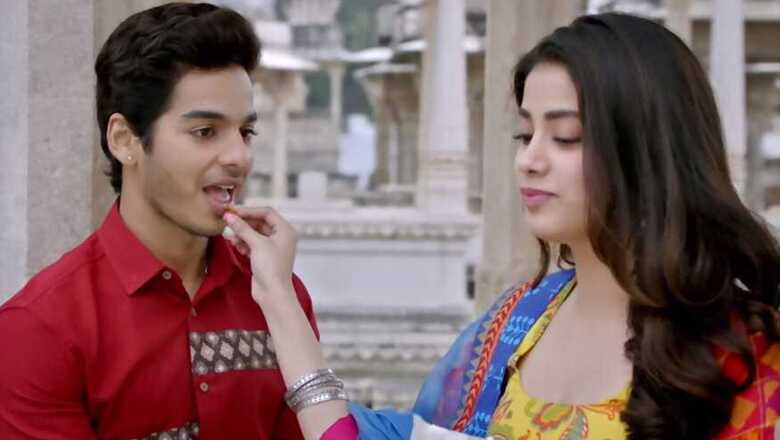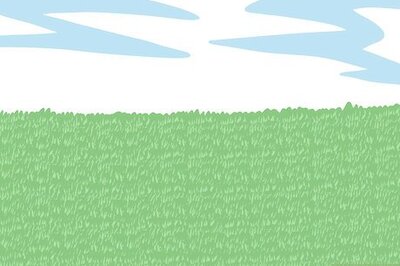
views
Cast: Ishaan Khatter, Janhvi Kapoor, Ashutosh Rana, Kharaj Mukherjee, Shridhar Watsar, Ankit Bisht
Director: Shashank Khaitan
A young fellow, having worked his way through a shared snack with his female companion, drinks from a mug of water in a plastic drum at the roadside food vendor. She crinkles her nose when he offers her the mug for a sip, prompting him to buy her bottled water instead. It’s a seemingly innocuous moment from Nagraj Manjule’s Sairat, but oh, so telling – the couple, their backs against each other, both drinking water. Yes water, that great leveler; required by both the rich and the poor, by those belonging to every caste and class, and yet the very clue in this moment that points to the yawning divide between this pair.
That scene – like many others – has been left out of Dhadak, the Hindi remake of Manjule’s excellent Marathi film from 2016 about the intensely gripping and ultimately tragic romance between a lower-caste boy and an upper-caste girl in rural Maharashtra.
Caste is a thorny, complex issue with a history of deep-rooted prejudices, injustice, and far-reaching consequences. When honestly explored, we get extraordinary stories like Sairat, Masaan, and Manjule’s own previous film Fandry. But the caste angle, evidently too hot to handle in a mainstream Bollywood film, is largely swept under the rug in Dhadak.
The story, which is robbed of texture and nuance when relocated from Bittergaon village in central Maharashtra to a tourism-brochure version of Udaipur, is centered on the romance between Madhukar aka Madhu (Ishaan Khatter) and Parthavi (Janhvi Kapoor). She is the daughter of a rich, influential father who owns a hotel and has political ambitions. He is the son of middle-class parents who run a modest restaurant. Her family will have none of it. The young couple must flee.
Director Shashank Khaitan is faithful to the beats of the original film but makes some questionable decisions. The hero’s friends, so crucial to the plot in Sairat, are reduced to stock caricatures here, particularly a vertically challenged fellow exploited strictly for laughs. With the caste narrative reduced to a mere footnote, the villain too – Parthavi’s father (Ashutosh Rana) – is at best your standard disapproving parent, a role the actor already played in the director’s previous film Humpty Sharma Ki Dulhania.
In the original film the action shifts to Hyderabad and the couple (Parshya and Archie) are put through the wringer as they go about building a life together. Madhu and Parthavi in Dhadak land up in Kolkata, but their struggle, relatively sanitized, can be best described as the Dharma Productions version of a hard life.
There’s also the matter of the film’s climax, a different one from the original. It’s chilling and devastating, not unlike Sairat. But again, given that the caste narrative is never integral to the story, it doesn’t feel suitably earned. Ultimately you could interpret it as the final move in a revenge plot.
But wait, it’s not as if Dhadak is entirely a waste of time. There’s something especially refreshing about watching young, raw newcomers discover their craft… witnessing the unpredictability of a performance, a new approach to a familiar emotion. Ishaan and Janhvi have a winning, charming chemistry, and they’re both extremely watchable even if they have contrasting styles.
Ishaan, who was especially impressive in his debut film Beyond The Clouds, once again radiates warmth and innocence, and reflects both the grappling and the growing maturity of a boy on the cusp of adulthood. Janhvi, meanwhile, has less to work with, because Parthavi is never as well-defined as Archie in Sairat. But Janhvi, who’s making her debut here, has a fragility that makes her instantly endearing, and a soulful quality that makes it hard to take your eyes off her on screen.
The director utilizes them well, giving them scope to perform drama, the odd bits of comedy, and really puts their dancing skills to test in the madly infectious Zingaat number, which composers Ajay-Atul and lyricist Amitabh Bhattacharya successfully refashion in Hindi.
Dhadak is ultimately a homogenous Karan Johar production that offers comfort in the familiar...for those seeking it. For the rest of us, it’s just baffling why the folks involved would choose to remake a film about the horrors of caste supremacy, but erase practically every mention of caste from the film.
I’m going with two-and-a-half out of five. The kids make it worth your time.
Rating: 2.5 / 5
Write your review


















Comments
0 comment